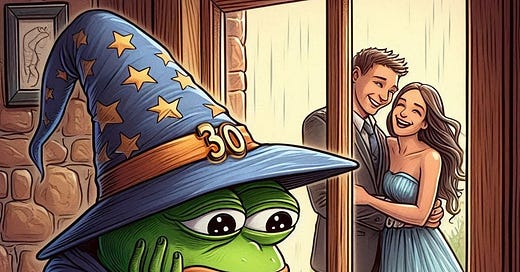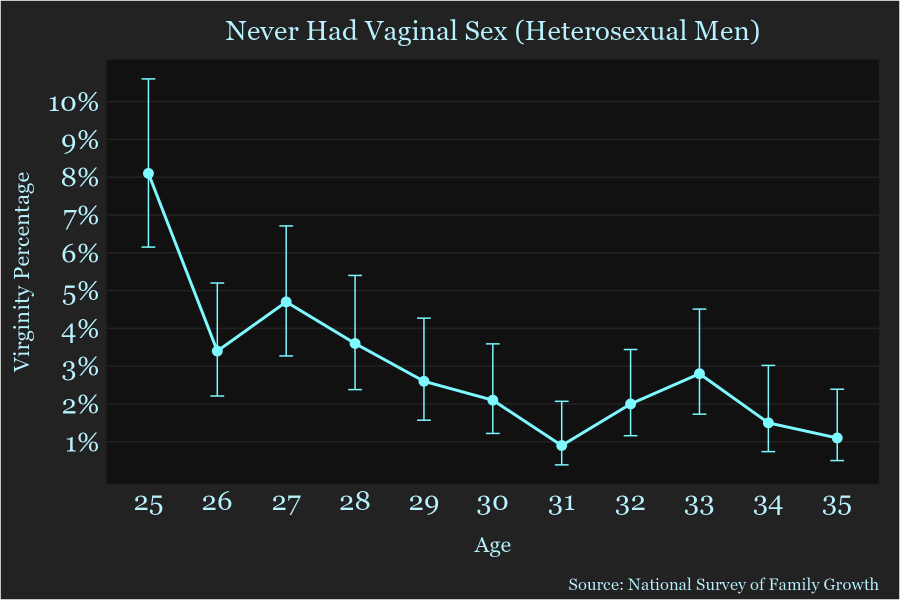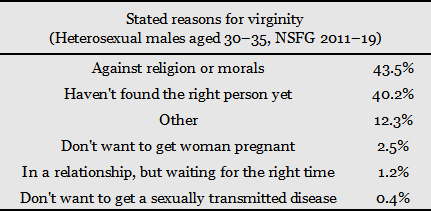The fabled 'wizard': the man who reaches the ripe age of 30 without coming into contact with a vagina sans the one from which he emerged. Wiktionary defines it thusly:
The sense of "old (male) virgin" is from a Japanese Internet meme where virgins who are typically friendless, shy, outcasts, and loners who don't fit in anywhere, legendarily gain magical powers upon reaching 30 years of age; popularized ultimately by 4chan and adjacent online incel spaces.
How many have the honour of bearing this title?
According to data from the 2011–2019 National Survey of Family Growth, by the mid to late 20s, the virginity rate1 among heterosexual men has fallen below 10%, and by age 30, it has fallen to 2%.
Out of 3,374 men aged 30–35, 69 (eks dee) remained virgins, or about 2% (1.8% after weighting).
Even this may overestimate inwizzes (involuntary wizards), as when asked to state the reason for their virginity, 43.5% said it was against their religious or moral beliefs. The next most common response, selected by 40.2%, was 'haven't found the right person yet', which can reasonably be interpreted as an 'involuntary' reason. 'Other' is more ambiguous, but if we assume that half of these represent involuntary reasons, this would leave half of wizards in the volwiz category, and the remaining 1% can be classified as inwizzes.
Of course, this analysis is focused only on sexual experience; one could argue that the inability to find a suitable and willing partner isn't quite as voluntary.
Who travels down this path?
This dataset contains a variety of sociodemographic variables which may help to explain what leads one down this path. The upper age limit2 was lifted to enhance statistical power. Several notable differences between wizards and muggles emerged. Wizards were more likely to have completed a college degree, yet were also less likely to have ever held a job or earned an annual income above 50k in their most recent job. They were also far more likely to still reside with their parents, with approximately half doing so. They were more likely to have been born to an intact family. While they weren't significantly more likely to be religious, they were more actively religious as they were more likely to attend religious services on a weekly basis. This aligns with a large portion reporting religious or moral reasons for remaining virgins. Furthermore, wizards were more likely to have abstained from alcohol in the past year, less likely to have smoked pot, have a history of imprisonment, be Hispanic, and be overweight (but not obese). No significant difference in height was found.
All of these variables barring having smoked pot or been born into an intact family showed independent effects in a multivariate logistic regression model controlling for age. Additionally, living in a metropolitan area, and being underweight emerged as significant positive predictors, and being black as a negative predictor. Having an intact family at birth switched over to being a negative predictor.
I also did a quick analysis of Wave IV of the National Longitudinal Study of Adolescent to Adult Health, in which subjects were aged 24–32. Among heterosexual males, 5.1% remained virgins. This dataset includes physical attractiveness ratings made by the interviewer. Neither this nor height or BMI showed significant effects. This time there was a significant negative effect of education on virginity, even after controlling for date of birth. Earning 50k or more and having drank alcohol more than a few times had strong negative effects, and frequency of religious attendance a positive effect.
Meuwly et al. analyzed 2017 Swiss survey data. Among 2,736 men aged 26, 6% remained virgins. Virgin men were in poorer health, more likely to live with their parents, less satisfied with their social life, less likely to have been drunk or smoked cigarettes or pot, and less likely to have used online dating—again indicating the presence of volcels. More women than men reported voluntary reasons for their virginity, however: while 47.4% of men attributed their virginity to a lack of opportunity, only 15.6% of women did. In contrast, 43.7% of women said they hadn’t found the right person, compared to 18.1% of men.
A recent study by Abdellaoui and colleagues examined genome-wide association data from the UK Biobank to identify traits that predict remaining a virgin later in life. Among 186,373 men aged 39–73, 1,861 (1%) remained virgins. IQ and socioeconomic status were among the strongest predictors—tfw to intelligent to have sex. Autism was also a predictor, in line with stereotypes and with other studies such as by Schöttle et al. which found that among men who were on average in their late 30s, 44.6% of high-functioning autistic men were virgins, while none of the neurotypical men were. Additionally, 35.7% reported having sex less than once a month, compared to just 3.5% of neurotypical men. This was despite only 3.6% of autistic men reporting no desire for sexual intercourse.
Other variables related to socialization, such as extraversion and frequency of social interactions with friends and family, showed effects in the direction you’d expect. Likewise for risk-taking and substance use. Perhaps less intuitively, neuroticism, major depression, and anxiety were higher among virgins. It could be because these traits are also associated with impulsive behaviour. Also, despite the trope of the ‘troubled genius’, these traits negatively correlate with intelligence, and we’ve seen the effect this has. On the other hand, there were positive phenotypic associations between virginity and being less happy and having more nervous feelings.
Regarding physical characteristics, the height pill took another L as it didn’t have a significant effect, and if anything wizards were taller than average. Men with higher BMI were less likely to be wizards, though the relationship with body fat wasn’t significant. The ‘wristcel’ meme might actually have some merit to it, as wizards had weaker grip strength. They also had slightly less lean arm mass, so it looks like ‘gymcelling’ could actually be more effective than leg-lengthening procedures (assuming it’s not some underlying mediating factor—which is always possible—though they didn’t find an effect of testosterone on virginity).


They also analyzed an Australian sample aged 18–89. Self- and observer-rated facial attractiveness weren’t significantly associated with polygenic scores for virginity for either men or women, though the sample sizes for people who were rated weren’t massive at 1,938 for self-ratings and 1,354 for observer-ratings. Still, it shows that the effects of these other traits is probably largely independent of attractiveness.
Conclusion
If you make it this far, you are the one percent. For many, this fact is too harsh to swallow. There will be men in this cohort still kvetching over ‘Chad’ as if the reason they are in the 1% is because they’re not in a different 1%. The truth is, having sex is really not some Herculean feat or reserved for aesthetically flawless ubermensch. The idea that up to this point ‘Chad’ is ‘having all the fun’ while the rest go through most of their 20s sexually deprived before they get the chance to be a ‘betabux’ for a ‘post-wall roastie’ with a body count in the triple digits who if he is lucky will grant him monthly starfish sex is also, of course, pure unadulterated cope. Men and women’s virginity rates decline with age in tandem, and the sex partner distributions remain more or less identical for young men and women. We’ve run the experiment long enough to know that polygnyny—‘de facto’ or otherwise—does not naturally flourish in an ‘open sexual marketplace’. If anything, polygyny is the system requiring coercion to sustain. No matter how desperately various social deviants wish to believe they represent the average male, the vast majority of men enjoy a fair share of satisfying sexual and romantic experiences before they hit 30. To some, this comes as a major black pill, which is why they cling to the more palatable blue pill fantasy wherein 99% of men are chronically sexless. Sure, not everyone will always be fully satiated, not everyone will be able to date models, and gender disparities in sexual desires will inevitably lead to moments of frustration, but that’s life.
We are witnessing a slight decline in sexual activity, most clearly observed in the youth, but still, this ‘extended adolescence’ probably won’t be a permanent condition for many. Some people are forecasting an ‘explosion of wizards’, largely driven by the misleading 2018 GSS graph, but I’d be surprised if it ever surpasses 5%.
A cope which is sometimes advanced to explain why most men don’t remain virgins into their mid to late 20s is to say that they’re resorting to ‘escortcelling’. However, only about 1% of men aged 25–30 reported having paid for sex in the past year, so it's unlikely that many are losing their virginities this way. Also, 40% of these men were either married or cohabiting at the time of the interview, so men don’t only visit escorts out of desperation or a permanent inability to attract partners, either.
Insight into some of the underlying factors was gained. Alcohol consumption consistently appeared as a negative predictor of virginity, which can be interpreted in several ways. One is that it reflects an underlying tendency for risk-taking or sensation seeking. Another is that drinking is often a social activity, so lower alcohol consumption could suggest a less active social life and thus fewer opportunities to meet potential partners. Lastly, alcohol can have a direct effect by lowering inhibitions.
The 'black pill' posits that men's romantic and sexual outcomes are determined entirely by variance in physical morphological characteristics, with the lion's share of the focus being on facial attractiveness and height. Autism, low extraversion and socialization, and risk aversion were all predictors of wizardhood, however. Most wizards probably earn their status simply through being very shy, lacking social skills, and retreating from the world of normies into the safety of their rooms and the online world. With how much high quality porn is at your fingertips and with it providing an endless amount of entertainment through ‘vidya’ and movies etc., it's easier than ever to fall into this lifestyle and never break out of it.
The stock black pill response is that this is simply the result of failing to meet the supposed looks threshold required for social acceptance, but contrary to the ‘blank slate’ theory of the mind that black pillers espouse, looks don’t meaningfully relate to personality or psychopathology, longitudinal studies find no interaction between looks and psychosocial development, nor do looks significantly impact people’s number of friends or frequency of socialization.
High intelligence and education seem overall to be positive predictors. Like true wizards, I guess they've eschewed carnal pleasures and devoted their lives to the pursuit of knowledge. Some may at least find some solace in knowing that they’re in the company of several prominent historical figures, Newton and Tesla being famous examples. Fewer wizards seemed to have a good personal income though. Whether this is because men with lower incomes are less desirable as partners or it’s a proxy for something else such as social or behavioural issues leading to underemployment isn’t entirely clear.
‘Voluntary celibacy’ is often dismissed as a cope, but frequency of religious attendance was another predictor, consistent with a good number of wizards reporting being so due to religious or moral reasons.
Even though physical traits play a big part in initial impressions, they don’t appear to be terribly relevant to extreme cases like this where it seems like significant neurodivergence is typically required, and ironically the ones that did surface as predictors weren’t the ones that black pillers tend to emphasize.
Some of this stuff could be framed within the context of a ‘slow life history strategy’, though it's a stretch to describe being a 40 year old virgin as any kind of 'evolutionary strategy'. Maybe in a different environment they would’ve tended to fare a bit better.
There are some who may find this to be an optimistic message: 99% of men will ‘make it’ to one degree or another. For those in or approaching this cohort however, that they’re this aberrant may come as a bitter realization. Since the average age of sexual initiation is around 17.5, a wizard is almost 5,000 days behind.
Unfortunately, for many it may have passed the point of no return. Any struggles in relating and connecting to people will have only grown more stark from likely extended isolation. Tolerance for inexperience will have considerably dwindled. Wizard magic memes attempt to add levity to the situation, but the regretful feeling of having missed out on a vital part of your youth might be tough to shake, and no amount of magic can rewrite what has already been written.
In the event that a life of celibacy lies ahead, Jesus Christ's example shows that it may still be possible to find purpose, however. Let us pray that those facing such a path are able to follow in his footsteps without succumbing to the darkness.
I used the variable ‘rhadsex’, which is coded as 1 if respondents had either married or cohabited before or answered yes to the following question: ‘Have you ever had sexual intercourse with a female (sometimes this is called making love, having sex, or going all the way)? Do not count oral sex, heavy petting, or other forms of sexual activity that do not involve vaginal penetration’.
In three of the surveys the ages went up to 44 (with a few being 45 at the time of the interview), but in one it went up to 49.









For me, the reasons are multifaceted. It's mostly my autism which is to blame, but it's also because I'm disgusted by genitalia and bodily functions.
Very insightful and well written. I laughed a bit reading the wristcel part due to the fact that I have unusually small wrists myself and it's a tiny insecurity. I've actually had an okay amount of opportunity that I never took advantage of probably because I have a problem of worrying about my perceived imperfections.
However, what's weird is that I'm actually a good looking dude but what I do KNOW is that I'm boring that's what I've been told by two women who wanted to fuck me. I'm at home all day trying to day trade my way to success (which I'm failing miserably). My life feels like an engine that fails to get the ignition going so then I just get stuck in a doom loop.
If I had to describe it in a couple of bullet points, it's something like:
-Failing to do the things that make you more fuckable (i.e. Money, Muscles, Game) and...
-Not to consistently placing yourself in enough social settings while also failing to convert opportunities into results.